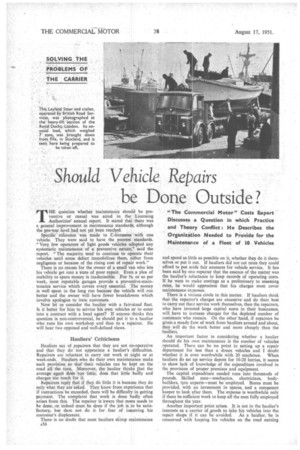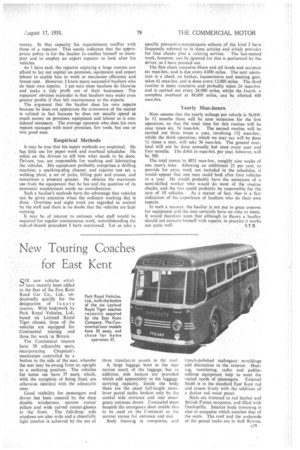Should Vehicle Repairs be Done Outside?
Page 54

Page 57

If you've noticed an error in this article please click here to report it so we can fix it.
“The Commercial Motor" Costs Expert Discusses a Question in •which Practice and Theory Conflict: He Describes the Organization Needed to Provide for the Maintenance of a Fleet of 10 Vehicles
'PT's' question whether maintenance should be pre
ventive or casual was' aired in the Licensing Authorities' annual report. It stated that there was a general improvement in maintenance standards, although the pre-war level had not yet been reached. , , , . , Spec& ' reference was Made to C-licensees with one vehicle. They were said to have the poorest standards. "Very few operators of light goods vehicles adopted any systematic maintenance of a... preventive nature," said the report. "The majority tend to continue to operate their vehicles until some defect immobilizes them, either from negligence or because of the rising cost of repair work.",
There is no excuse for the owner of a small van who lets his vehicle get into a state of poor repair. Even a plea of inability to spare money is inadmissible. For 5s. or so per week, most reputable garages provide a preventive-maintenance service which covers every essential. The money is well spent in the long run because the vehicle will run better and the owner will have fewer breakdowns which involve apologies to irate customers.
Now let us consider the haulier with a fair-sized fleet. Is it better for him to service his own vehicles or to enter into a contract with a local agent? If anyone thinks this question is non-controversial, he should put it to a haulier who runs his own workshop and then to a repairer. He will hear two opposed and well-defined views.
Hauliers' Criticisms Hauliers say of repairers that they are not co-operative and that they do not appreciate a haulier's difficulties. Repairers are reluctant to carry out work at night or at week-ends. Hauliers .who do their own maintenance make such provision so that theirvehicles can be kept on the road allthe time. Moreover, the' haulier thinks /hat the average agent does too little, does that •little badly and charges to much for it. Repairers reply that if they de} little it is because they do only what they are asked, They know from experience that if instructions be exceeded, there will be difficulty in getting payment. The complaint that work is done badly often arises from this. The repairer is aware that more needs to be done, ,or indeed must be done if the job is to be satisfactory; but dare not do itfor fear of incurring his customer's displeasure.
There is no doubt that most hauliers skimp maintenance
and spend as little as possible on it, whether they do it themselves or put it out. If hauliers did not cut rates they could afford to put aside fair amounts for vehicle service. It has been said by ore repairer that the essence of the matter was the haulier's reluctance to keep records' of operating costs. If he were to make costings as a preliminary to assessing rates, he would appreciate that his charges must cover maintenance expenses.
There is a vicious circle in this matter. If hauliers think that the repairer's charges are excessive and do their best to carry out their service work themselves, then the repairers, who have invested large capital sums in their businesses, will have to increase charges for the depleted number of customers who remain. On the other hand, if repairers be given a steady fl ow of work from hauliers around and about, they will do the work better and more cheaply than the hauliers.
An important factor in considering whether a haulier should do his own maintenance is the number of vehicles operated. There can be no point in setting up a repair department for less than a dozen vehicles and I doubt whether, it is even worthwhile with 20 machines. When hauliers do set up service depots for 10-20 lorries, it seems to show lack of knowledge of the expenditure involved in the provision of proper premises and equipment.
The capital expenditure needed runs into thousands of pounds. Skilled men—mechanics, electricians, bodybuilders, tyre experts—must be employed. Stores must be provided, with an investment in spares, and a competent keeper to look after them. The expense is worthwhile only if there be sufficient work to keep all the men fully employed throughout the year.
Another important point arises. It is not in the haulier's interests as a carrier of ,goods to take his .vehicies into the
repair shops if it can be avoided. As a 'haulier, he is concerned with keeping his vehicles on the road earning
money. In that capacity -his requirements conflict with those of a repairer. This surely indicates that the appropriate policy is for the haulier to confine himself to. transport and to employ an expert repairer to look after his vehicles.
As I have said, the repairer enjoying a large custom can afford to lay out capitalon premises, equipment and expert labour to enable him to work at maximum efficiency and lowest cost. HoWever. I know many successful hauliers who do their own repairs. I am sure most hauliers do likewise and make a tidy profit out of their businesses. The repairers' obvious rejoinder is that hauliers may make even greater profits if they left-maintenance to the experts.
The argument that the haulier does his own repairs because he does,nOt appreciate the eccinomics of the matter is refuted in fact because he does not usually spend as much money on premises, equipment and labour as is considered necessary. The average operator who does his own repairs manages with scant premises, few tools, but One or two good men.
Empirical Methods It may be true that his repair methods are empirical. He has little use for paper work and overhaul schedules. • He relies on the drivers to tell him what needs to be done. Drivers, too, are responsible for washing and lubricating the vehicles. His equipment. probably comprisesa drilling machine, a sparking-plug cleaner, and injector test set, a welding plant, a set of jacks, lifting gear and cranes, and sometimes a pressure greaser. He obtains themaximum use froth the equipment that he has and the question of its economic employment needs no consideration.
Such a haulier's methods have the advantage that vehicles can be given attentionwhen. the ordinary working day is done. Overtime and night work are regarded as normal by the staff and there is no doubt that the vehicles are kept running.
It may -be of interest to estimate what staff would be required for regular maintenance work, notwithstanding the rule-of-thumb procedure I have mentioned.' Let us take a specific *writhe-maintenance scheme of the kind I have frequently referred to in these articles and which provides for four checks plus a %skiing seri/ice. The last-named work, however, can be ignored for this is performed by the driver, as I have pointed out.
The first check concerns Filters and oil levels and occupies six man-hrs., and is due every 4,000 miles. -The next operation is a check on brakes, transmission and steering gear. takes 41 man-hrs. and is done every 12.000 miles. The third routine is more extensive and probably -takes 24 man-hrs. and is carried out every 24,000 miles, whilst the fourth, a complete overhaul at 48.000 miles, can -be allotted 400 man-hrs.
Yearly Man-hours Now assume that the yearly mileage per vehicle is. 36;000. In 12 months there will be nine occasions for the first operation, so that the total time for this routine will be nine times six, 54 man-hrs. The second routine will be carried out three times a year, involving in man-hrs., whilst the third operation, which' we may say will be done 11 times ayear, will take 36 man-hrs. The general overhaul will, not be done annually but once every year and four months. The debit in man-hrs. per year, however, will be 300,
The total comes to 4031 man-hrs., roughly nine weeks of one man's time. Allowing an additional 25 per cent. to provide for extra work not included is the schedules, it would appear that one man could look after four vehicles in a year: lie would probably have the assistance of a semi-skilled worker who would do most of the routine checks, and the two could probably be responsible for the care of 10 vehicles. As a matter of fact, that is a fair indication of the experience of hauliers who do their own repairs. • In such a manner. the haulier is not put to great expense for equipment and the men certainly have no tithe to waste. It would therefore seem that although in theory a haulier should not concern himself with repairs. in practice it works out quite well. ' S.T.R.




















































































